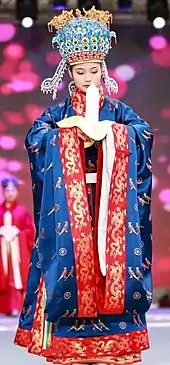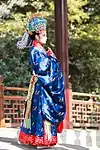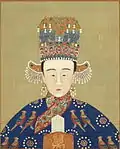Diyi
Huidi-yi (褘翟衣) is the historical Chinese attire worn by empresses and crown princesses (wife of crown prince) in the Ming Dynasty. It is a formal wear meant only for ceremonial purposes. It is a form of shenyi, and is embroidered with long-tail pheasants (翟, Di) and circular flowers (小輪花). It is worn with phoenix crown (without the dangling string of pearls by the sides). Diyi has been worn by empresses and other royal noblewomen (differs according to different dynasties) since the Zhou Dynasty under various names like huiyi (褘衣) in Zhou and Song Dynasty, and miaofu (庙服) in Han Dynasty.[1]

Korean Version
2 variations of the diyi had been developed in Korea during the Joseon Dynasty, & later in the Korean Empire. The developments were as follows:
- During the Joseon Dynasty, the diyi was known as "Chijeok-ui" (雉翟衣 치적의), and is characterized as a predominant red outfit with a similarity to the wonsam.
- During the Korean Empire, the chijeok-ui was later changed into the (original) blue with red trim similar to its Chinese model.
Diyi were worn by:
- Princesses Consort on their marriage to the Crown Prince and on major ceremonies (大禮服 대례복 daeryebok).
- Queens Consort on their coronation ceremony and on major ceremonies (大禮服 대례복 daeryebok).
- The King's subsequent Queens Consort[2] on their marriage to the King.
Gallery
 Side view of diyi
Side view of diyi A Ming Dynasty portrait of an empress wearing diyi
A Ming Dynasty portrait of an empress wearing diyi A Song Dynasty portrait of an empress wearing huiyi
A Song Dynasty portrait of an empress wearing huiyi
See also
Notes and references
- 历代皇后最典型的翟衣 Archived 2011-07-16 at the Wayback Machine, XICI.net, Retrieved 2009-12-08
- In the event that the first Queen Consort had died.